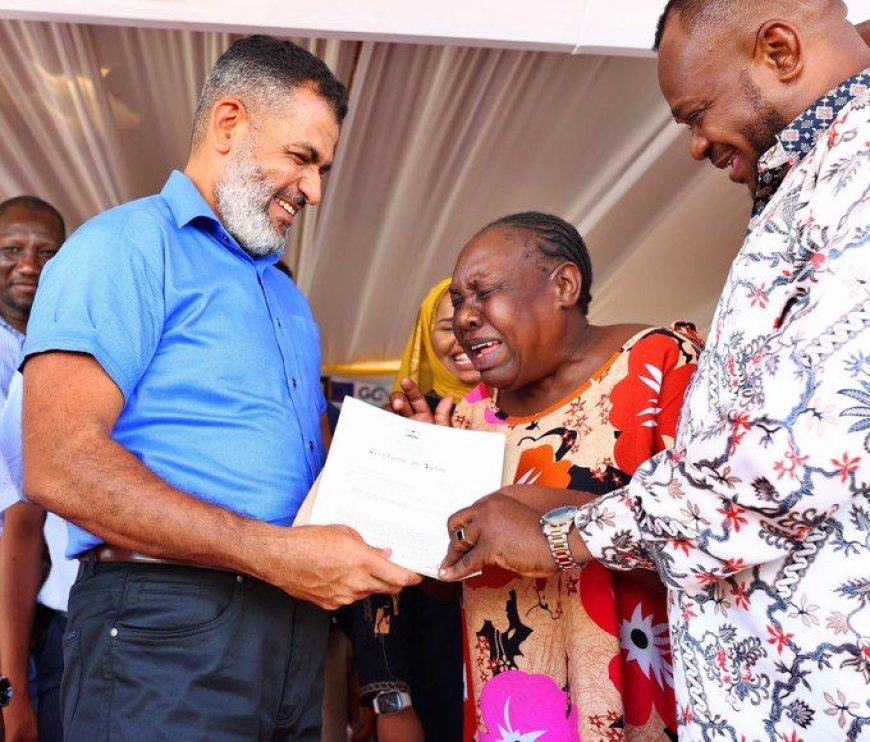Mombasa embraces the tenant purchase model to end the squatter problem

Mombasa,
Tuesday, October 3, 2023
KNA by Sadik Hassan/Chari Suche
Mombasa County Government has adopted the tenant purchase model to address the perennial squatter problem.
The devolved government in partnership with the Ministry of Land issued 1000 title deeds to squatters in Mikindani ward during the observance of World Habitat Day.
The theme of this year’s World Habitat Day is resilient urban economies, cities as drivers of growth and recovery.
Governor Abdulswamad Nassir reiterated his commitment to end the squatter problem in Mombasa during his tenure in office with land still being a thorny issue in the coastal city.
He said his administration has secured necessary financing on behalf of the residents to negotiate with land owners whose land is occupied by squatters.
“The idea will allow squatters to assume ownership of titles progressively in a tenancy purchase structure guaranteed by the County Government of Mombasa,” said Nassir.
“Through the partnership we have with the National Government we will issue 700 titles to Chaani settlement through the Kenya Informal Settlement Improvement Programme (KISIP),” he added.
Nassir urged land owners who received title deeds to utilize them for their own benefits of developing the lands.
The governor said the county government is planning to issue at least 3,000 title deeds in the area.
Principal Secretary for the State Department for Housing and Urban Development Charles Hinga in his speech read by Mr. Hiram Kahiro hailed Mombasa as a pacesetter in embracing climate change as a key component in addressing urban resilience in the cities for sustainable human settlement and urban development.
“Our cities, municipalities, and towns play pivotal roles as drivers of growth and recovery to the path of a sustainable future by integrating climate change mitigation and adaptation strategies into urban planning and development,” said PS Hinga.
Cities, he added, can promote resilient urban economies including supporting sustainable industries, fostering the creation of green jobs, and investing in renewable energy infrastructure.
PS Hinga noted Mombasa due to its geographical and strategic position as a port of entry to Kenya is prime to implement climate change mitigation actions.
The PS said the government has put in place numerous policies to guide urbanization through the provision of a framework of sustainable urban development, strengthening urban governance and management, development planning and urban investments, and the delivery of social and physical infrastructure throughout the country.
To build the resilience of the urban poor the government has rolled out climate resilience actions to create awareness on urban building.
KISIP, being implemented by the State Department for Housing and Urban Development, aims to improve living conditions and strengthen security of tenure in informal settlements through investing in infrastructure based on plans developed in consultation with the community.
On her part, Kenya Permanent Representative to UN-Habitat Ambassador Jean Kimani said achieving sustainable equitable resilient urban development requires concerted actions and behavioral change across the entire urban ecosystem.
UN-Habitat and the Ministry of Lands have developed the Habitat Country programme to guide UN engagement and interventions in Kenya.
Mombasa is also working with the Go-Blue project to apply nature-based solutions in the management of wastewater discharge from the Mikindani informal settlement.
Jomvu Member of Parliament (MP) Badi Twalib called on the county boss to ensure that schools in the area are not left out in the issuance of title deeds.
“I promise to work together with the county government to settle this issue of squatters, after we are done with the local residents, let’s look into the schools and ensure they also get title deeds,” he said.
Courtesy; KNA
What's Your Reaction?



































































































































































































































































































